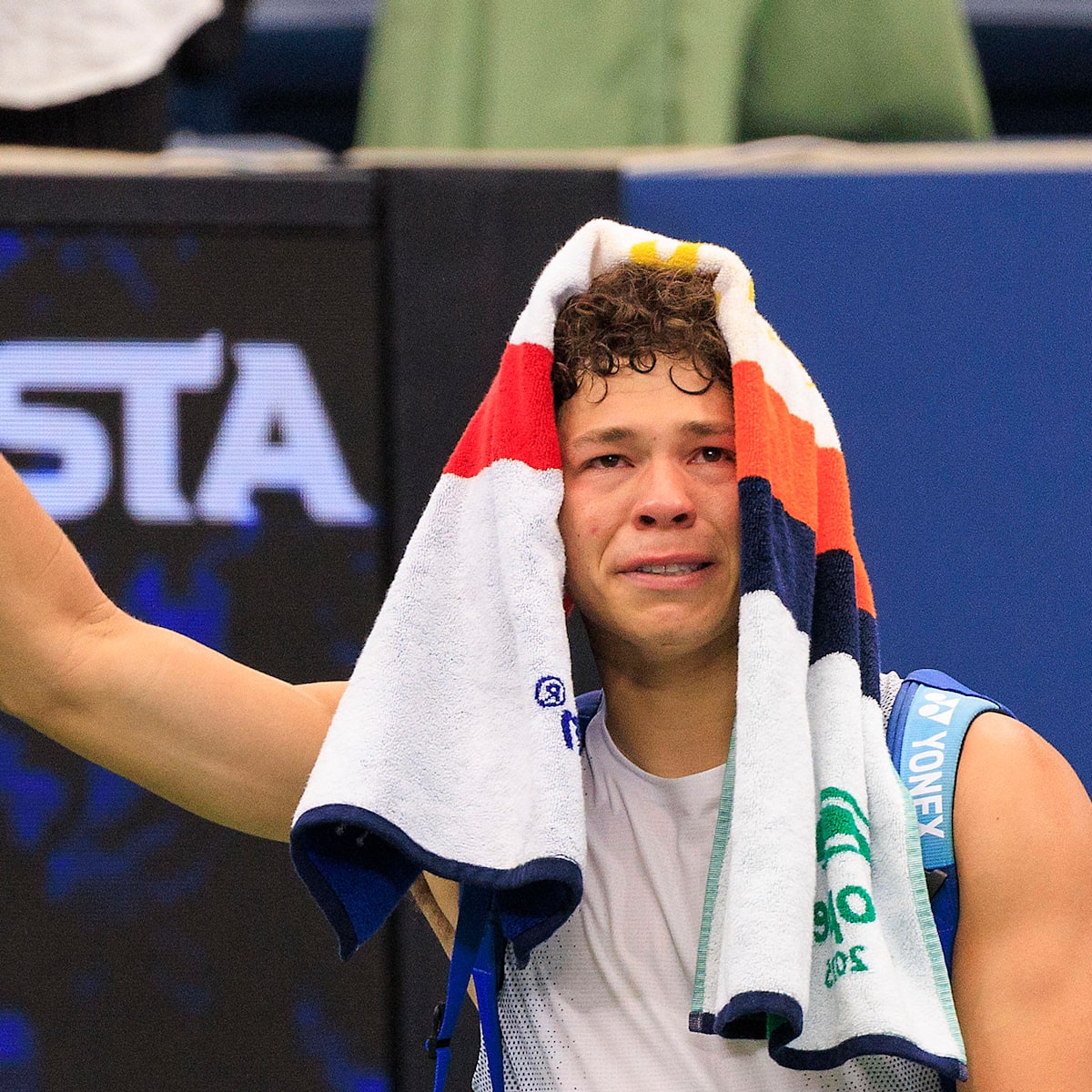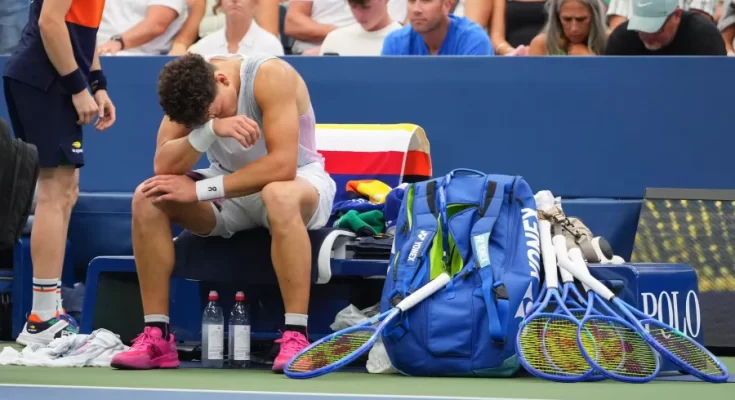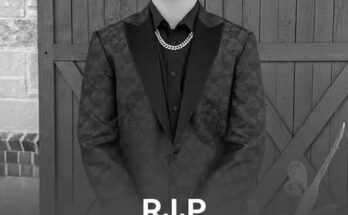Ben Shelton’s journey at the US Open Tennis Championships came to an unexpected halt when he was forced to retire due to an apparent shoulder injury, but even in the disappointment of the moment, he displayed the kind of maturity and positivity that have defined his young career. For Shelton, this was not just about a missed opportunity at one of tennis’s biggest stages, but rather a lesson in resilience, perspective, and growth. As the crowd at Flushing Meadows gave him support, Shelton managed to keep his composure, offering words of gratitude and hope rather than frustration, a rare trait for a player in his early 20s who has quickly risen to prominence on the ATP Tour.
The retirement came during a match in which Shelton was visibly struggling to produce the kind of explosive serves and powerful groundstrokes that have become his trademark. His shoulder had been bothering him in previous tournaments, but the intensity of a Grand Slam match made the issue more evident. As he tried to push through, it became clear that continuing would not only jeopardize his chances in the match but also potentially put his long-term health at risk. In a sport where athletes are taught to fight through adversity, knowing when to step away can be one of the hardest calls to make. Shelton made that decision with a level of maturity that reflects his awareness of the bigger picture.
Shelton’s ability to stay positive in such a difficult moment stems from his background and mindset. The son of former professional player and college coach Bryan Shelton, Ben has grown up around tennis, learning not just the technical aspects of the game but also the mental side. His family has always emphasized resilience, patience, and humility, and those values were on display as he spoke after the match. Rather than focusing on what he lost, Shelton spoke about what he gained from the experience of competing on one of the sport’s biggest stages, and about how setbacks can often serve as the fuel for greater achievements down the line. It was a reminder that sports are as much about character as they are about victories.
In the world of professional tennis, injuries are unfortunately part of the grind. The physical demands of the tour, with its relentless schedule and global travel, test the body to its limits. Shoulders, in particular, take a significant toll from serving, and Shelton’s powerful lefty delivery makes him especially susceptible to overuse. Fans and analysts will now be watching closely to see how Shelton and his team manage his recovery. But beyond the technical aspects of rehabilitation, Shelton’s attitude suggests he has the right mindset to turn this challenge into an opportunity. He acknowledged that injuries can be discouraging, but he also pointed out that they force players to pause, reflect, and come back stronger. That sense of long-term vision is crucial for a player who is still in the early stages of what promises to be a long career.

The timing of the injury was certainly unfortunate, as Shelton was seen as one of the young Americans capable of making a deep run at the US Open. His powerful game, electrifying energy, and confident demeanor had already made him a fan favorite, and many were eager to see how far he could go in New York. For a rising star, these moments can feel crushing. Yet Shelton refused to allow the narrative of disappointment to dominate. He pointed instead to the progress he has made in the past year, his gratitude for the support of fans, and his belief that his best tennis is still ahead of him. That ability to keep things in perspective may ultimately define his career as much as his on-court results.
Shelton’s story also resonates because it ties into a larger narrative about the new generation of American tennis. Alongside players like Frances Tiafoe, Taylor Fritz, Tommy Paul, and Coco Gauff, Shelton has become part of a wave of U.S. talent bringing excitement back to the sport. The American public, hungry for stars to succeed in the post-Serena Williams era, has latched onto these personalities not just for their skills, but for their authenticity and passion. Shelton embodies that perfectly. His willingness to engage with fans, his energetic style, and his refusal to be discouraged by setbacks make him a symbol of hope for U.S. tennis. Even in retirement from the tournament, Shelton managed to strengthen his bond with supporters by showing them a side of himself that went beyond tennis—a side that values resilience and optimism.
One of the more remarkable aspects of Shelton’s reaction was his refusal to let the moment overwhelm him emotionally. Athletes at all levels often talk about the importance of staying present, of not letting external circumstances dictate their mindset, but actually doing so in the heat of the moment is far more difficult. Shelton admitted that he was disappointed, but he quickly reframed the narrative, saying that every setback is part of the journey. This approach not only helps him personally but also sends a message to fans and young players watching. It teaches them that success is not always about linear progress; sometimes it’s about the ability to handle adversity gracefully and to keep moving forward when things don’t go according to plan.
The support Shelton received in New York was a reflection of how much the tennis world has already embraced him. Fans cheered as he walked off the court, and social media was filled with messages of encouragement and praise for his resilience. Fellow players, too, acknowledged his situation, with many expressing confidence that he will come back stronger. That collective outpouring of support underscores Shelton’s growing role in the sport. He is not just a competitor; he is becoming a role model. His ability to connect with fans on an emotional level, especially in moments of vulnerability, enhances his reputation in ways that victories alone cannot.
Looking ahead, Shelton’s next steps will be critical. He and his team will need to prioritize his health, ensuring that he does not rush back before he is fully ready. Modern sports medicine has advanced to the point where shoulder injuries can often be managed successfully, provided there is patience and care in the recovery process. For a young player with so much potential, the priority will be sustainability—making sure that his career can span not just a few exciting seasons but potentially a decade or more of high-level play. Shelton’s positive mindset should serve him well in this phase, as athletes who approach recovery with determination and discipline often come back not only physically stronger but mentally tougher.
The episode also offers a broader reminder about the nature of professional sports. Fans often focus on results, rankings, and titles, but behind the scenes, athletes are constantly managing their bodies, emotions, and expectations. Shelton’s retirement due to injury highlights how fragile success can be, and how quickly circumstances can change. Yet it also highlights the human side of competition—the way athletes cope with challenges, the way they interact with fans, and the way they choose to frame their experiences. In choosing positivity, Shelton provided a moment of inspiration that transcended the match itself.
For American tennis, Shelton’s response is particularly important. Young fans look up to him not just for his booming serves and athleticism but for his approach to the sport and to life. His ability to stay upbeat in the face of adversity sends a powerful message about perseverance. It also reinforces the idea that success in sports is not solely measured by trophies but also by character. If Shelton continues to carry himself with this kind of resilience, he may very well become one of the defining figures of his generation, both on and off the court.
While his US Open run ended sooner than he hoped, the way Shelton handled the situation may leave an even more lasting impression than a string of victories would have. Tennis is full of stories about athletes who achieved greatness despite setbacks, and Shelton seems poised to add his name to that list. His journey is still in its early chapters, but already, he is demonstrating the qualities that define champions: determination, perspective, and the ability to find light even in difficult moments. For fans, that is something to celebrate, and for Shelton, it is the foundation upon which he will build the next phase of his career.
As the dust settles on his early exit, Shelton’s mindset will likely serve as a guiding force for his recovery and return. He has shown that he understands the importance of patience, the value of perspective, and the role of gratitude in navigating the ups and downs of professional sports. Whether he comes back in weeks or months, Shelton will bring with him not just his powerful game but also the lessons he has learned from this setback. That combination of talent and mindset may ultimately prove to be his greatest strength.
In the end, Ben Shelton’s retirement from the US Open was not just a story of injury but of resilience and hope. He turned a moment of disappointment into a demonstration of character, reminding fans why they believe in him and why the future of American tennis looks so bright. For Shelton, this is just one chapter in a much larger story—a story that promises to include not only triumphs but also the kind of setbacks that shape true champions. And if his reaction in New York is any indication, Shelton is ready for whatever comes next, embracing the journey with positivity, patience, and an unshakable belief in his future.



